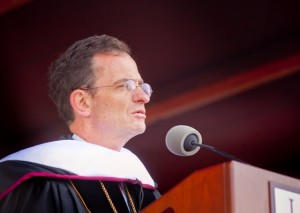President Daniel H. Weiss presented his farewell remarks to graduating seniors at the 178th Commencement. His speech is below.
Read more Commencement coverage

President Daniel H. Weiss presents his farewell remarks at the 178th Commencement.
As you come to the end of your college careers (which is going to happen in about five minutes), it is understandable—and even wise—that you would want to reflect on the meaning of this life-changing experience, indeed as Zach just has, both in terms of its impact on you now and what it portends for the futbure. For many, the progression is something like the following: right now your Lafayette degree is mostly a promising credential, as you begin graduate school or a new job you will appreciate at least some of what you actually learned here, in a few decades this time of your lives will be remembered as a source of old friendships and mostly pleasant experiences, and eventually your college years will evolve into a blissful and utterly flawless memory.
Somewhere along this continuum—I hope sooner rather than later—each of you will turn to thinking carefully about what you really learned in college, and especially about how the experience helped you to value the power of ideas and, even more, to reflect on who you are and what you believe. If Henry David Thoreau was right in saying that, “the world rests on principles,” I would argue that so too does each individual life rest on its own principles—and on your belief in the power of ideas. Indeed, I would suggest that what you believe is the most important thing because, inevitably, it serves as the foundation of your character and the basis for your actions.
We all hope and expect that your education at Lafayette has equipped you for many things, ideally leading to personal happiness and professional success. But I hope too that it has given you the skills, and the desire, to do the serious work of reflection about what you believe.
For many people, determining what you believe is simply the cumulative result of your reactions to what happens around you. What do you think of Obamacare or the war in Iraq? Is global warming a real threat to the environment? Should we allow guns on college campuses? Has bipartisanship become an artifact of the 20th century?
I would suggest that determining what each of you believes is an exploration deeper than simply assessing how you feel about a series of specific and often transitory issues, and this work can help to ground you in ways that will surprise you and, ideally, serve you well in the years ahead. It will also define who you are.
In order to figure this out you need to reflect carefully on your own values and how you understand your role in the world. What are your obligations to yourself and to others? Is there such a thing as perfect justice? What real importance is there to what you believe or what you do? How can you actually bring about productive change in the world? This, in part, is what we mean when we talk about an examined life.
These questions and others will help you to figure out what you believe—and that is the first step to making a difference. With a deeper understanding of who you are and what you can contribute comes a greater desire actually to engage and to make a difference.
I believe that the world improves one good idea at a time—and that is the only way it ever improves. I hope that you can take what you have learned here to find your way to making a difference. As Thoreau said, “Your success will be in proportion to your devotion to ideas.” More than anything else, may that be the enduring legacy of your college experience.

1 Comment
Comments are closed.